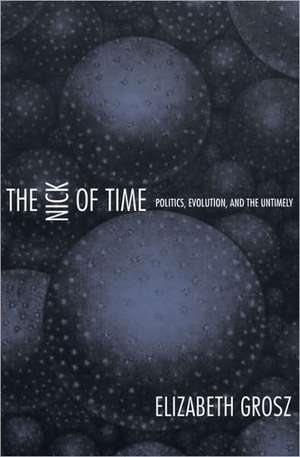The Nick of Time – Politics, Evolution, and the Untimely
Autor Elizabeth Groszen Limba Engleză Paperback – 5 dec 2004
Preț: 245.09 lei
Nou
Puncte Express: 368
Preț estimativ în valută:
46.90€ • 49.10$ • 38.80£
46.90€ • 49.10$ • 38.80£
Carte indisponibilă temporar
Doresc să fiu notificat când acest titlu va fi disponibil:
Se trimite...
Preluare comenzi: 021 569.72.76
Specificații
ISBN-13: 9780822333975
ISBN-10: 082233397X
Pagini: 336
Ilustrații: 3 figures
Dimensiuni: 156 x 237 x 24 mm
Greutate: 0.45 kg
Ediția:New.
Editura: MD – Duke University Press
Locul publicării:United States
ISBN-10: 082233397X
Pagini: 336
Ilustrații: 3 figures
Dimensiuni: 156 x 237 x 24 mm
Greutate: 0.45 kg
Ediția:New.
Editura: MD – Duke University Press
Locul publicării:United States
Cuprins
Acknowledgments vii
Abbreviations ix
Introduction: To the Untimely 1
Part I. Darwin and Evolution
1. Darwinian Matters: Life, Force, and Change 17
2. Biological Difference 40
3. The Evolution of Sex and Race 64
Part II. Nietzsche and Overcoming
4. Nietzsche's Darwin 95
5. History and the Untimely 113
6. The Eternal Return and the Overman 135
Part III: Bergson and Becoming
7. Bergsonian Difference 155
8. The Philosophy of Life 185
9. Intuition and the Virtual 215
Conclusion: The Future 244
Notes 263
References 297
Index 309
Abbreviations ix
Introduction: To the Untimely 1
Part I. Darwin and Evolution
1. Darwinian Matters: Life, Force, and Change 17
2. Biological Difference 40
3. The Evolution of Sex and Race 64
Part II. Nietzsche and Overcoming
4. Nietzsche's Darwin 95
5. History and the Untimely 113
6. The Eternal Return and the Overman 135
Part III: Bergson and Becoming
7. Bergsonian Difference 155
8. The Philosophy of Life 185
9. Intuition and the Virtual 215
Conclusion: The Future 244
Notes 263
References 297
Index 309
Recenzii
Superbly written, deftly executed and wonderfully instructive, The Nick of Time is a first-class piece of writing and thinking. It is unique in that it is interested in philosophy of life issues not only for their own sake but also because of Groszs wider theoretical and practical commitments such as feminism and a radical cultural politics. Keith Ansell Pearson, author of Germinal Life: The Difference and Repetition of DeleuzeElizabeth Groszs The Nick of Time is a major work. It achieves a richly nuanced and sweeping reconsideration of temporality in the context of contemporary feminist theory, critical theory, and theories of evolution. The considerations of Darwin, Nietzsche, Bergson, Deleuze, and Irigaray are especially impressive. The Nick of Time is essential reading for anyone interested in understanding how memory, historicity, and politics connect to and are reconfigured by temporality.N. Katherine Hayles, author of How We Became Posthuman: Virtual Bodies in Cybernetics, Literature, and InformaticsElizabeth Grosz traces a timely path through the work of three major thinkers. Darwin, Nietzsche, and Bergson, each in his own way, force a rethinking of duration and transformation at the interchange between nature and culture. The Nick of Time suggestively connects their trajectories, drawing them together into a contemporary dialogue on the politics and philosophy of change.Brian Massumi, author of Parables for the Virtual: Movement, Affect, SensationSuperbly written, deftly executed, and wonderfully instructive, The Nick of Time is a first-class piece of writing and thinking. It is unique in that it is interested in philosophy of life issues not only for their own sake but also because of Elizabeth Groszs wider theoretical and practical commitments, such as feminism and a radical cultural politics.Keith Ansell Pearson, author of Germinal Life: The Difference and Repetition of DeleuzeElizabeth Grosz presents vitalism as the radically new and transgressive thought that would overcome centuries of philosophical negation of the future, of the virtual and becoming
Humanism is not simply abandoned as the evil centre of a deterministic metaphysics that might be over come in the name of vital life; instead it is the concept of the over-man, or what follows once the human recognizes its material and temporal complexity, that for Grosz opens a radical notion of sexual politics. Professor Claire Colebrook, University of Edinburgh
Notă biografică
Elizabeth Grosz is Professor of Women's and Gender Studies at Rutgers University. She is the author of "Architecture from the Outside: Essays on Virtual and Real Space"; "Space, Time, and Perversion: Essays on the Politics of Bodies"; and "Volatile Bodies: Toward a Corporeal Feminism." She is the editor of "Becomings: Explorations in Time, Memory, and Futures."
Textul de pe ultima copertă
"Superbly written, deftly executed, and wonderfully instructive, "The Nick of Time" is a first-class piece of writing and thinking. It is unique in that it is interested in 'philosophy of life' issues not only for their own sake but also because of Elizabeth Grosz's wider theoretical and practical commitments, such as feminism and a radical cultural politics."--Keith Ansell Pearson, author of "Germinal Life: The Difference and Repetition of Deleuze"
Descriere
Prominent feminist theorist rethinks the relationship between evolution and the biological body through the study of three key figures--Darwin, Nietzsche, and Bergson.
